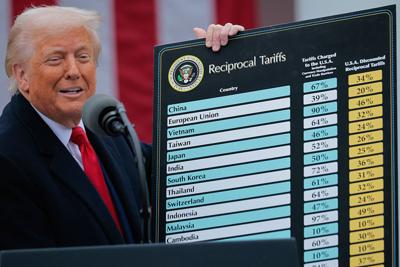Donald Trump’s tariff ultimatums move around a lot, earning him the hated nickname (Trump Always Chickens Out). His latest deadline is to reach trade “deals” (actually, non-binding memoranda, not conventional treaties) with more than 100 countries, including Canada, by Aug. 1.
Whether he sticks to that timeline or not, our federal government is already preparing Canadians to accept a deal that does not remove Trump’s tariffs on Canada. Those tariffs currently target autos, steel, aluminum, and copper, as well as a threatened across-the-board 35 per cent tariff on everything else.
That would be worse for Canada than not reaching a deal at all.
Any agreement that preserves Trump’s illegal tariffs would lock Canada into a subservient role for many years to come. And there’s no assurance that Trump would even live up to his end (given his regular violations of more comprehensive binding deals, like the Canada-U.S.-Mexico Agreement).
Perhaps there’s no immediate way to stop Trump from continuing down this path. Canada’s previous concessions (on border security, defence spending, and rescinding the Digital Services Tax) made no difference.
Of course, lower higher tariffs are better than higher tariffs, and the federal government may try to convince Canadians to accept an imperfect deal on this basis. It’s possible the average tariff on Canadian products under an Aug. 1 deal would be incrementally lower than those being paid by other countries — including those that have already reached “deals,” like China (47 per cent), Indonesia (19 per cent), or the U.K. (10 per cent).
This glass-half-full logic is dangerous, however. It’s not just the average tariff rate that determines how much damage will result from Trump’s attacks. The size and composition of trade also matters.
After all, the very structure of our economy has been shaped by a generation of tariff-free trade within North America. As a result, Canada is more dependent on exports to the U.S. than almost any other economy. Our U.S.-bound exports equal more than 25 per cent of total GDP. That means even a seemingly lower effective tariff rate will cause far more damage to Canada than faced by almost any other country. (Only Mexico is in the same boat.)
Prime Minister Mark Carney updated the premiers on the state of trade negotiations with the U.S. as they met Tuesday in Ontario's cottage country.Ìý
By my estimates, U.S. tariffs under a Trump “deal” would be — several times more than other major trading partners (including China and the EU). Their economies are much less exposed to disruptions in exports to the U.S. For them, even a higher tariff rate won’t cause remotely the same damage.
So trying to portray a deal with continued tariffs as some kind of “victory” for Canada, because the stated tariff may seem lower than other countries, is dangerously wishful. On top of that, accepting a bad deal has other consequences.
It would unilaterally disarm Canada’s ability to respond to U.S. actions with counter-tariffs or nontariff measures. It would cement U.S. tariffs as a “new normal” — and thus unleash a flood of capital away from Canada, as firms give up hope that Trump’s tariffs are just a temporary bargaining ploy. It would sabotage nascent efforts with other countries to build a co-ordinated global response to Trump, by surrendering before a united front can take shape.
It would also squander the potential of growing political, economic, and financial turmoil in America to finally stay Trump’s hand. This is the most vulnerable moment of his presidency. He faces protests over health-care cuts, immigration raids, and ´³±ð´Ú´Ú°ù±ð²âÌý·¡±è²õ³Ù±ð¾±²Ô. Giving him a big trade win now would buttress his authority at home — but for Canada would constitute an own goal of historic proportions.
We all wish Trump’s trade war could be defused through friendly negotiation. It’s not going to happen. But even if tariffs are inevitable in the short run, our ability to resist and survive them in the long run is undermined if we codify those attacks in the form of a lopsided, damaging “deal.”
A bad deal with Trump is worse than no deal. Canadians know that standing up to our suddenly-hostile neighbour is daunting. But voters affirmed their readiness for that challenge just months ago. The federal government needs to take confidence from Canadians’ capacity to fight for a sovereign economy — and ratify that courage by rejecting Trump’s ultimatums and continuing to strive for something better.
Ìý
Error! Sorry, there was an error processing your request.
There was a problem with the recaptcha. Please try again.
You may unsubscribe at any time. By signing up, you agree to our and . This site is protected by reCAPTCHA and the Google and apply.
Want more of the latest from us? Sign up for more at our newsletter page.




























To join the conversation set a first and last name in your user profile.
Sign in or register for free to join the Conversation